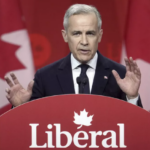Canadian Politics, Gender Ideology
Is Pierre Poilievre rejecting the foundational premise of the transgender movement?
For the past decade, Canada’s federal government has operated in total submission to the transgender movement. The Trudeau government chucked millions of dollars at LGBT groups. Trudeau has viciously attacked provincial premiers such as Danielle Smith for recognizing parental rights and legislating protections for gender dysphoric minors.
The Trudeau government passed Bill C-16, adding “gender expression” and “gender identity” as protected grounds to the Canadian Human Rights Act and to the Criminal Code.
Opposition to this law, you might remember, is what launched Dr. Jordan Peterson from an obscure professorship to international stardom: his refusal to engage in “compelled speech” by using the “preferred pronouns” demanded by trans-identifying students. Canadian LGBT activists regularly affirm Peterson’s free speech warnings by claiming that failure to use “preferred pronouns” or engaging in “misgendering” is, in fact, a punishable hate crime in Canada. The transgender movement’s ideology and language has been imposed from the top down — from the very top, at that.
This image — of the prime minister solemnly raising the transgender flag on Parliament Hill — encapsulates that fact succinctly.
But with Trudeau and the Liberals on their way out — albeit via an irritating leadership race detour — that might change. Conservative leader Pierre Poilievre has stood up for parental rights, responding to Trudeau’s condemnation of parental rights protestors as “homophobic,” “transphobic,” and bi-phobic” in 2023 by stating: “ Justin Trudeau always divides to distract from all he has broken. This time, he is demonizing concerned parents. Parents should be the final authority on the values and lessons that are taught to children. Trudeau should butt out and let parents raise their kids.”
This is significant, considering the instinctive allergic reaction the federal Conservatives usually have whenever an issue that can be labeled “social conservative” comes up.
But, far more significant is Poilievre’s deliberate rejection of trans activist language when addressing the issues.
Last year, for example, a CTV reporter asked what his response was to “trans women’s fears that they will be harmed if they are not allowed to use bathrooms appropriate for their gender?” The question, of course, is framed around transgender premises, and the intent is to force Poilievre into a “gotcha” debate around whether “transgender women” are, in fact, women. If they are, of course, shouldn’t they be permitted into spaces reserved for women?
Instead of falling into the trap, Poilievre responded calmly the way normal Canadians speak.
“My commonsense view is that women’s spaces should be preserved for women,” he replied. The reporter tried again, this time making the trap explicit. “You refer to biological men,” she said. “Do you believe that trans women are women?”
Poilievre replied perfectly: “I believe that women’s spaces should be reserved for women, and that’s a commonsense approach. For example, we need to have women’s sports that are reserved for women, because of the biological differences that men and women have.”
He expanded briefly on the point and moved on. The reporter didn’t get the headline she wanted, but every Canadian listening to Poilievre’s answer — outside of a small, extremist set of activists — will readily understand precisely what he is saying, because that is how we all talked until about five minutes ago.
Poilievre’s answer wasn’t a one-off, either — it is clearly a deliberate strategic decision regarding how to speak about this issue.








